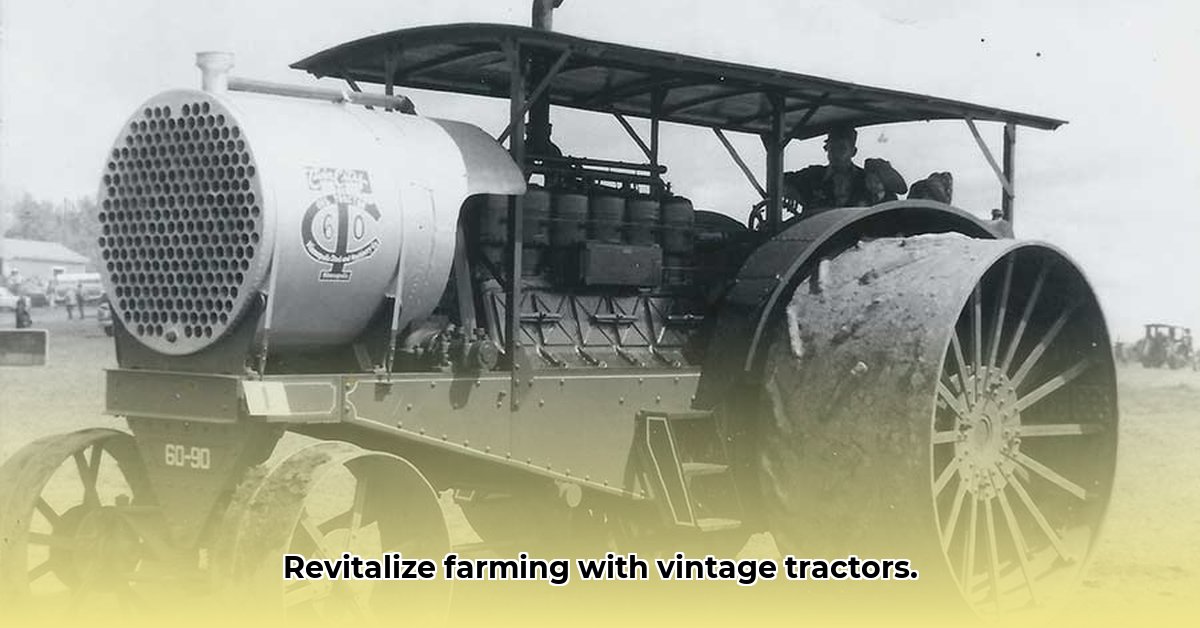
The Enduring Appeal of Antique Tractors
Sustainable agriculture is experiencing a surge in popularity, driving a corresponding increase in demand for dependable farm equipment. While modern tractors often dominate dealerships, there's a growing interest in a unique alternative: large, vintage tractors. This isn't simply nostalgia; there are sound practical reasons. Antique tractors frequently offer significant cost savings compared to their modern counterparts. Many older models are mechanically simpler, potentially leading to lower repair bills—provided you possess the necessary mechanical skills. Beyond practicality, these machines carry a certain romance, connecting current farmers to the rich history of agriculture. They represent a legacy, a tangible link to generations past—a heritage many farmers appreciate. For more information on classic tractors, check out this resource.
Weighing the Pros and Cons of Antique Tractors
Considering a vintage tractor? Let's weigh the advantages and disadvantages to make an informed decision.
Advantages:
- Significant Cost Savings: The initial purchase price is substantially lower than for new equipment, making them an attractive option for smaller operations or those on a budget.
- Potentially Simpler Mechanics: Simpler mechanical designs can sometimes translate to easier troubleshooting and repairs for mechanically inclined individuals. Fewer electronic components minimize potential digital headaches.
- Durable Construction: Many antique tractors were built robustly, designed to endure years of challenging farm work.
- Unique Charm and Nostalgia: There's an undeniable appeal in owning a piece of agricultural history. These tractors often embody character and a connection to the past.
Disadvantages:
- Parts Acquisition Challenges: Locating replacement parts can prove difficult, requiring resourceful searching through salvage yards, online forums, and specialized suppliers.
- Maintenance Demands: Regular maintenance is critical. Repairs can be time-consuming and might demand specialized skills or knowledge.
- Fuel Efficiency Concerns: Older engines typically have lower fuel efficiency than their modern counterparts, which can affect operating costs.
- Lower Productivity Compared to Modern Equivalents: Antique tractors might be slower and less efficient than modern high-horsepower tractors, particularly for large-scale operations, potentially increasing time needed for tasks.
Buying an Antique Tractor: A Practical Guide
Ready to buy? This step-by-step guide will help you navigate the process:
Thorough Model Research: Before beginning the search, research different models. Consider horsepower, power take-off (PTO) capabilities, and how well the tractor's features align with your specific farming needs. Utilizing online forums and antique tractor clubs provides invaluable resources and insights. Consulting with experienced owners offers real-world guidance.
Meticulous Pre-Purchase Inspection: A thorough inspection is non-negotiable. Look for leaks, rust, and wear and tear on crucial components – transmission, engine, and hydraulics, among others. Bringing a knowledgeable mechanic or experienced antique tractor owner is highly recommended for a more thorough evaluation.
Realistic Cost Assessment: Before submitting an offer, honestly evaluate the tractor's condition and anticipate potential repair costs. Include parts and labor expenses in your calculations. Negotiate the sale price accordingly. A lower initial cost can often offset the expense of future repairs.
Professional Pre-Purchase Inspection (Highly Recommended): Investing in a pre-purchase inspection by a qualified mechanic is often a wise move. This professional assessment can identify hidden problems, preventing costly surprises down the line.
Complete Documentation: Ensure you acquire all necessary paperwork – title and service records. This protects your legal interests and provides a clearer understanding of the tractor's history and condition.
Modern Tractors and Sustainable Practices: A Comparison
Modern tractors offer advanced features – GPS guidance, auto-steer, fuel-efficient engines – improving resource use and minimizing environmental impact. Precision farming techniques allow for targeted fertilizer and pesticide application, reducing waste and maximizing efficiency. However, the high cost of modern tractors presents a substantial barrier for many small-scale and beginning farmers.
Bridging the Technological Gap: Making Sustainable Tech Accessible
Sustainable farming shouldn't be limited by farm size or budget. Several avenues can help overcome financial limitations:
- Government Grants and Subsidies: Research available grants and subsidies for sustainable farming practices and equipment purchases in your area.
- Cooperative Ownership: Pooling resources with other farmers allows for shared ownership and use of modern equipment, reducing individual financial burdens.
- Equipment Sharing Programs: Local programs can connect farmers needing particular equipment with owners, broadening access to modern technologies.
Conclusion: Selecting the Right Tractor for Your Farm
The ideal tractor depends on your specific needs, budget, and long-term goals. Whether you opt for the affordability and charm of an antique tractor or the efficiency and precision of a modern machine, careful consideration is crucial for supporting your sustainable farming vision. Remember, the best tractor is the one that best meets your specific needs and contributes to the success of your operation.